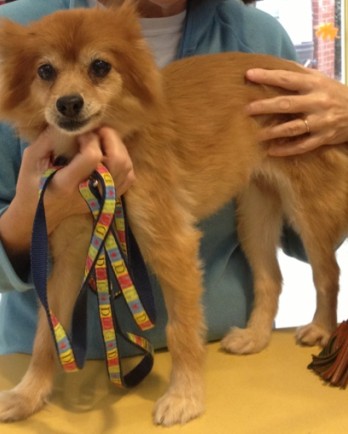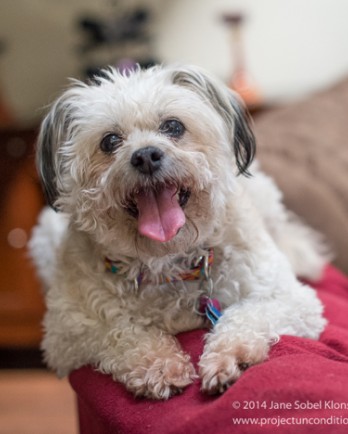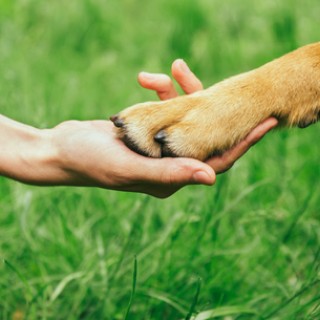Virginia Beach SPCA: Care, Comfort, and Compassion for Senior Pets by Dyanna Uchiek
Founded in 1966, the Virginia Beach SPCA is a nonprofit humane society that cares for domestic and wild animals and offers humane education in the Virginia Beach, VA area. Grants from The Grey Muzzle Organization have helped them give veterinary care to senior dogs whose owners are undergoing financial hardship, and provide medical treatment for adoptable senior dogs like Ginger. This post was written by Dyanna Uchiek of Virginia Beach SPCA, with additional material from Dawn Richardson.
At the Virginia Beach SPCA (VBSPCA), our mission is to create a more humane and responsible community by decreasing our tolerance for cruelty while increasing our capacity for compassion. We are dedicated to all the animals that come to us, but the senior pet population is probably one of the most rewarding demographics of shelter animals we serve at the VBSPCA.
The VBSPCA takes in and cares for almost 4,000 homeless domestic animals each year. As the only humane organization to hold a state and federal permit for the rehabilitation and release of wildlife in Virginia, we take in nearly 2,200 wildlife animals annually and provide rescue and referral to another 1,500. We are proud of our mobile medical unit, the Neuter Scooter, that allows us to extend sterilization and vaccination services to animals in other communities. We remain committed to finding homes for all adoptable animals, and are dedicated to maintaining an adoption rate of 90%.
Each day, animals both young and old are brought to us in need of solace and care. We often see the senior dogs after their owners have passed away and no reliable arrangements have been made for the pets. These dogs can end up lost, depressed, and lonely. To best serve these animals, the VBSPCA has adopted what we like to call the Three Cs: Care, Comfort, and Compassion.
Care: When we talk about Care, we are generally referring to addressing the animals’ veterinary needs. Recently, we took in two senior Beagle brothers, Scooter and Buddy. Both of these guys suffered from dental disease so severe that they could hardly eat, and would shy away in pain when you reached to pet them. Scooter was in so much pain he would sometimes snap! It was clear to us that we could not get to know Buddy and Scooter’s personalities until we addressed their medical needs. After their dentals (and more than a few medications to treat their skin infections), Buddy and Scooter were new dogs! They were boisterous, playful, and outgoing, something we hadn’t been able to see in them previously. We were even able to find them an adoptive home together.
Eight-year-old Romeo was brought to our shelter after suddenly developing housebreaking issues. After his initial vet exam, it was clear that Romeo hadn’t forgotten his house manners, he had developed a urinary tract infection! In addition, Romeo had lost his hearing, and needed to have all but three of his teeth removed. After a few weeks in foster care, and lots of medications, Romeo was back to his old self, with no more “accidents” in the house! Like Buddy and Scooter, once we had taken care of Romeo’s health issues, he was able to go to a new home.
Comfort: Comfort has an obvious tie to “Care.” If we’re addressing senior dogs’ medical needs quickly, we’re clearly increasing their level of physical comfort. But providing comfort for a senior dog is just a little bit more involved than for a younger dog. Often they have arthritic joints, their senses aren’t as sharp, and their “normal” has been completely disfigured. Simple things—creature comforts, if you will—such as bathing and grooming them, providing them with “my size” toys and bowls, a canine companion, and comfy bedding are little things we can do for these guys to help them shine in the shelter environment. We even serve the majority of our senior dogs “softened food” (dry food soaked in warm water), as most of them suffer from poor dental care.
A recent resident in our kennel, an 8-year-old Maltese mix named Rabbit, shunned her Kuranda bed, and just sat on the floor and shook when she first came to us. We got her gussied up at the groomer, complete with hair bows and pink toe nails, and we gave her a little basket bed that she could easily get into and burrow under her blankets. We quickly realized how much Rabbit loved other dogs, so we housed her with some other low key dogs, and Rabbit was transformed! She was always tail wagging and bouncing around for her visitors.
Compassion: Compassion probably seems like a pretty obvious component to successfully caring for ANY shelter animal, but for seniors it takes a special kind of compassion to see them through their stay at the shelter. So often these dogs have served as faithful companions to their humans their whole lives, only to be suddenly uprooted and taken away from everything they’ve ever known, including their humans. Sometimes these animals are even grieving for the passing of their owners, and that adds another layer to the extraordinary emotions the sweet animals are experiencing.
It is our jobs as their caregivers to approach our service to them with a special kind of respect and understanding. When Peanut first came to us, she was a wreck. Shaking, crying, diarrhea. Her owner had died, leaving Peanut homeless and confused at 10 years old. Because of our comprehensive approach to serving senior dogs, we were able to make Peanut feel a little more at ease, like she was staying at a 5 star hotel, while she waited for her forever family to find her. She got to spend time in people's offices, napping on big comfy beds and being spoiled. Sometimes she would even get carried around like a baby by staff just because she was so at ease during these times. She gained weight, made some dog friends, enjoyed sweaters when it was cold.
It’s truly the little things that can make a senior shelter dog’s transition into their forever retirement home more comfortable and enjoyable.
Dogs like Romeo and Peanut are abandoned by people every day and we do our best to provide them with shelter, care, and love while they wait for their new family to find them. We use funding from The Grey Muzzle Organization to help get our senior dogs in the best physical condition possible so they present their best personality to potential adopters, and so their time in the shelter is less stressful.
Decreasing the length of stay in the shelter by finding homes for senior dogs is an important goal for us because it can be an extremely difficult environment for older dogs. Due to limited funding, we typically have to make potential adopters aware of the cost of medical treatments such as dentals, heartworm treatments, and mass removals prior to the animal being adopted. When senior pets have these extra costs tied to their adoption, they are passed up by potential adopters—this breaks our hearts. A Grey Muzzle grant gives us the ability to cover the medical costs for senior dogs, thus removing barriers so that individuals can consider adopting an older dog when they might not have otherwise.
To further our commitment to these wonderful senior dogs, we also offer lifetime membership to our low-cost medical clinic to all adopters of senior dogs. Grey Muzzle funding helps us provide more expensive and required medical procedures for the older dogs in our care, giving them the ability to put their best paw forward with potential adopters.
For more information about Virginia Beach SPCA and all of the wonderful organizations that Grey Muzzle supports, see Who We Help.
The Grey Muzzle Organization improves the lives of at-risk senior dogs by providing funding and resources to animal shelters, rescue organizations, sanctuaries, and other nonprofit groups nationwide.




